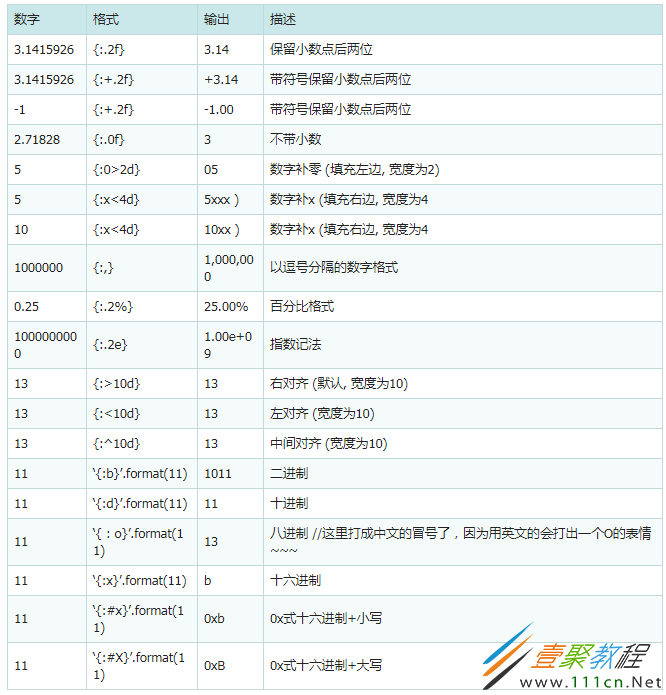Python格式化输出之format用法代码
本篇文章小编给大家分享一下Python格式化输出之format用法代码,文章代码介绍的很详细,小编觉得挺不错的,现在分享给大家供大家参考,有需要的小伙伴们可以来看看。
format用法
相对基本格式化输出采用‘%’的方法,format()功能更强大,该函数把字符串当成一个模板,通过传入的参数进行格式化,并且使用大括号‘{}’作为特殊字符代替‘%’
使用方法由两种:b.format(a)和format(a,b)。
一、填充
1.无参(1)
print('{} {}'.format('hello','world'))
hello world
2.无参(2)
print('{0} {1}'.format('hello','world'))
hello world
3.无参(3)
print('{1} {0} {1}'.format('hello','world'))
world hello world
4.key value
print('ID:{id},Name:{name}'.format(id='001',name='hello'))
ID:001,Name:hello
5.列表
list=['001','hello']
print('ID:{List[0]},Name:{List[1]}'.format(List = list))
print('ID:{0[0]},Name:{0[1]}'.format(list))
ID:001,Name:hello
ID:001,Name:hello
6.字典
dict={'id':'001,'name':'hello'}
print('ID:{Dict[0]},Name:{Dict[1]}'.format(Dict = dict))
print('ID:{id},Name:{name}'.format(**dict))
ID:001,Name:hello
ID:001,Name:hello
7.类
class value():
id = '001'
name = 'hello'
print('ID:{Value.id},Name{Value.name}'.format(Value = value))
ID:001,Name:hello
8.魔法参数
*args表示任何多个无名参数,它是一个tuple or list;**kwargs表示关键字参数,它是一个 dict。
args = [',','.']
kwargs = {'id': '001','name':'hello'}
print('ID:{id}{}Name:{name}{}'.format(*args, **kwargs))
ID:001,Name:hello.
二、数字格式化
三、叹号用法
print(‘{!s}好'.format(‘你'))
print(‘{!r}好'.format(‘你'))
print(‘{!a}好'.format(‘你'))
你好
’你’好
’u4f60’好
!后面可以加s r a 分别对应str() repr() ascii() 作用是在填充前先用对应的函数来处理参数
差别就是
str()是面向用户的,目的是可读性,
repr()带有引号,
ascii()是面向Python解析器的,返回值表示在python内部的含义,ascii (),返回ascii编码
















